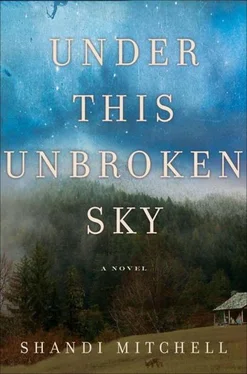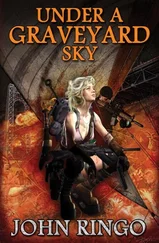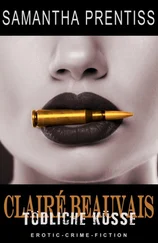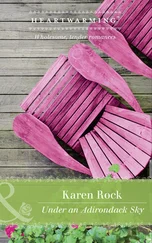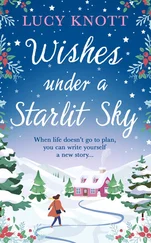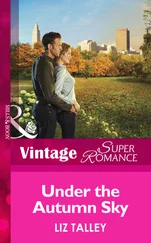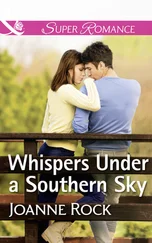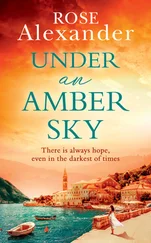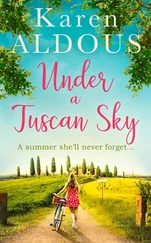Dania drapes the trees with bedding. White sheets, freshly laundered, stiffen with frost. She dresses the world with a kaleidoscope of blankets, quilts, pillows, and linens: soft blue, salmon, and yellow mingle with vivid orange and red. She suspends the woven flowers and embroidered stars, deer, rabbits, and wheat sheaves like pages from a storybook. A perfect, sunny world. She breathes in the lemon-scented soap. She will never forget this smell.
Myron has been splitting wood. The pile tumbles around him, large and sprawling. The frozen logs shatter effortlessly. His coat is folded neatly to the side. He needs only a sweater to fend off the chill. He doesn’t think where to place the log or strike the ax; his mind and hands perform automatically. He dances with the wood and the blade in perfect rhythm. The handle, polished by his and his father’s hands, is warm in his grip. He sets the log upend. His arms stretch upward, his strength pours from him through the handle into the blade, slamming into the heart of the wood. The vibration drives down through the log, a clean line erupts, and one piece falls open into two. He will never forget this sensation.
Ivan gathers the wood and stacks it by the door. Three cords are already piled as high as he can reach. He likes fitting the logs together, stacking them like a puzzle to make the tightest fit. He piles them straight, then gradually slopes them back to bear the weight. He mixes soft wood with hard, large logs with small. Each log displays its rings, telling him its age, its type, whether it rained too much one year, or not at all, if it was healthy or sick. Special wood, like a clean, unblemished white birch or lodgepole pine, he sets aside in a separate pile. They look like ordinary sticks of wood, but inside are birds and spoons, crosses and horses, waiting for his father to carve them free. Tato says the wood shows him what’s inside. Sometimes Ivan thinks he sees an eagle’s beak, a horse’s mane, a dog’s head, a dragonfly, an old man’s hand. He will always remember to look for what is hidden.
Sofia has shoveled proper paths leading from their door to the new barn, to the outhouse, to the twin boulders, and back around the house. The little roads curve and veer across the flatness, cutting through the snow. She walks the paths, loving the sound of her boots crunching on the hard-packed trail. Her skirt swishes daintily, untouched by the mess of snow. Her stockings are dry. Her gloved hands trail over the banks, as though she is like a fine lady strolling through a garden of white lilies. She will never forget the sensation of a wet, sticky snowball spattering the back of her head or the sound of her little sister’s gales of laughter as she chases her through the paths until they explode off the trails in a powdery cloud.
Katya will never forget how round and perfect the snowball was as it arced from her mitten, sailed through the air, and found its mark. A glorious accident, her first perfect throw. She will never forget the taste of the snow, its coldness slithering down her back, its softness as they tumble through it. How it sticks to their coats and leotards, hats and mitts, clumps in their hair, trickles down their collars. She’ll never forget lying on their backs begging each other to stop. And the quietness of being held by the snow, as they closed their eyes to the sun. Their faces warm, their backs cold. Their fingers covertly rolling another snowball.
They are all trying to forget their father, who hasn’t come outside the last three days. He is sitting in front of the window. Unmoving. Transfixed on a spot somewhere beyond them, down the hill, at the stone wall. He stood when Myron went to check the snares. He didn’t sit again until he saw his son trudging back up the hill. Myron victoriously held up a rabbit for his father’s approval, but Teodor was no longer watching.
Myron didn’t question him about the coyote tracks on the other side of the wall, or his father’s tracks, steady approaching the wall, then breaking into a full run, falling, then staggering down the hill to his sister’s house. Or the rabbit-pelt blanket he remembers his mother making that he found trampled amid the tracks. Or the drag marks. He pushed the pelt under the snow with his toe and brushed away the tracks.
Maria and Teodor haven’t spoken since that night. Too much was said that night. They can’t find the words to start again. When she finally found the strength to enter the house, she stood in the middle of the room, unable to comfort her children. She knew the sight of them would release the tears and she would tell them everything. No child should know such things.
In the past three days, she has bottled two dozen jars of borshch and sauerkraut; rolled countless holubtsi, using up three of her soured cabbage heads and four cups of rice; baked buckwheat rolls; and braised rabbit. Each meal is a grander feast. The children eat hesitantly, not asking for seconds, worried by their mother’s sudden abandonment of restraint.
She doesn’t let the children help. She doesn’t look them in the eye. She doesn’t hold them, or touch them. She consumes herself with her recipes, chopping and stirring, frying and baking. She empties her mind. She cooks from early morning to late at night. She washes the cast-iron pots and scours them in boiling water, unable to get them clean. Her hands are red and chapped. She hasn’t prayed. She hasn’t sent any baskets down the hill. She doesn’t allow herself to think about them. She is out of milk and eggs. She crosses from her mind recipes that require milk and eggs and scrubs the pots harder.
Teodor sits with a stillness learned in prison. If he sits quiet enough, long enough, he can make himself disappear. Empty his mind, no more thoughts. He can become a rock, the dirt floor, a log, the snow. He can just exist and not feel.
He gets up, startling Maria, who steps aside not knowing which way to turn. He crosses to her side of the room, slides aside the picture, retrieves the jug, and pours himself a drink. He feels her eyes watching his hand. He hammers the drink back, lets it burn his mouth, sear his insides, clean his brain. It churns in his stomach, gags at his throat. He stoppers the jug, puts it back in the wall, returns to his chair, and waits for it to dull the ache.
He should get up and check the horse, cut the fence poles for the new paddock, clear another acre of bush, get ready for the spring, finish the barn, build a granary, sharpen the tools… there is so much he could do if he was still alive.
A snowball hits the window with a thud, splays wide, and trickles down the pane. Teodor looks at the dissolving shape, trying to understand what has broken. Maria marches to the window, her mother instincts rearing up. They look outside and see a circus of snow children, laughing faces, ducking and running, dodging a snowball ambush. They see their children. Still innocent. Still alive.
Ivan pats another snowball in his mittened hands, waves at them to come out, ducking too late to evade Myron’s perfect aim.
Maria places her hand on Teodor’s shoulder. It’s time for them to go outside.
LESYA SHOVELS THE CHICKEN SHIT FROM THE COOP. She doesn’t speak to the two hens. She doesn’t dally. She does her job, briskly and efficiently. She changes their water, tops up their feed, reaches under their warm, fat bodies, retrieves the eggs, and sets them in the pail. She looks at the empty roost. The straw has been brushed away, revealing the chipped, faded advertisement of the smiling chin and the hand holding a cake of soap. A hard white lump of dung mars the model’s perfect teeth.
Lesya recognizes the soap. It’s the same soap that Aunt Maria gave them. Half a bar, anyway. It’s the soap her mother has been washing herself with. She’s had two baths a day since that night. With each use, the bar of soap diminishes. The edges round and soften. Now it is the size and shape of a pale-gray egg. Soon it will crack and break apart and there will be nothing inside.
Читать дальше
